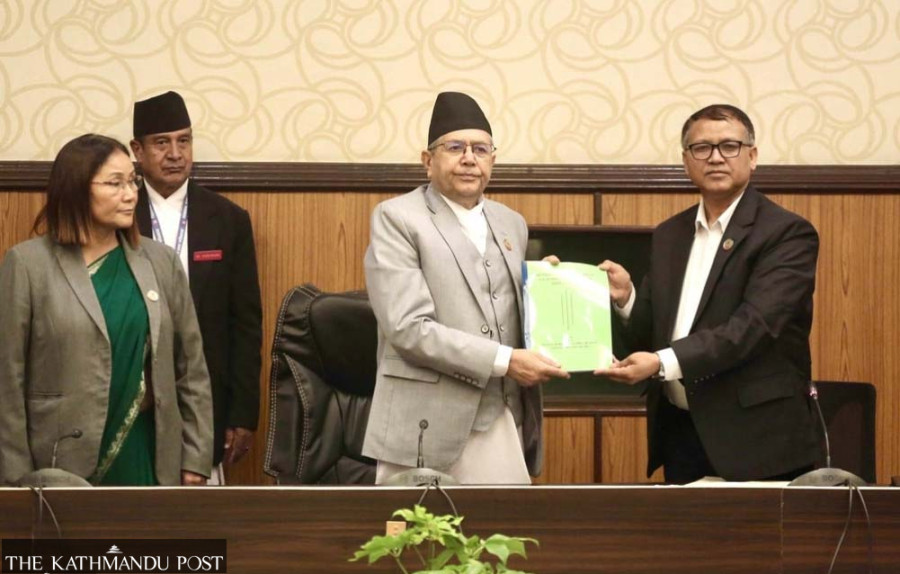National
Special committee recommends action against Ramhari Khatiwada for tampering with ‘cooling-off period’ provision
Probe report raises concerns over how the originally agreed-upon provision was diluted and over the conduct of top bureaucrats who opposed it.
Post Report
A special parliamentary committee investigating the tampering of the ‘cooling-off period’ clause in the Federal Civil Service Bill has submitted its final report, concluding that Ramhari Khatiwada, chair of the State Affairs and Good Governance Committee, should bear moral responsibility for the error.
The report, made public on Tuesday after being handed over to Speaker Devraj Ghimire by committee chair and Nepali Congress lawmaker Jeevan Pariyar, raises serious concerns over how the originally agreed-upon provision was diluted as well as over the conduct of top bureaucrats who opposed it.
The clause in question prohibits retired or resigned civil servants from being appointed to constitutional, diplomatic, or government positions for two years—a safeguard known as the ‘cooling-off period’. However, this provision was watered down in the version of the bill that was eventually passed, prompting an uproar in Parliament and the formation of the investigative committee.
According to the report, while there is no evidence of direct involvement of Chief Secretary Ek Narayan Aryal or other senior officials in altering the wording of Clause 82(4) and (5), their public opposition to the provision was deemed inappropriate.
“It is unbecoming for chief secretaries and secretaries to lobby against a provision that was passed by the parliamentary committee and the House,” the report states. “Their actions went beyond the expectations of their office and amounted to a breach of institutional conduct.”
The committee found that a group of senior civil servants, led by Chief Secretary Aryal, had actively lobbied against the cooling-off clause. They visited Prime Minister KP Sharma Oli in Singha Durbar and Nepali Congress President Sher Bahadur Deuba in Budhanilkantha, urging them to remove the provision. These efforts continued even after the bill had been endorsed by the House.
In the report, the committee stops short of alleging direct manipulation by these officials but criticises their attempt to influence the legislative process. “Forming a group and publicly lobbying to remove a provision already endorsed by the House cannot be considered consistent with the responsibilities of their roles,” the report notes.
The probe committee formed on July 7 and chaired by Congress lawmaker Pariyar had Congress whip Sushila Thing, UML MPs Narayan Prasad Acharya and Ishwari Gharti, Maoist Centre’s Madhav Sapkota, Rastriya Swatantra Party’s Ganesh Parajuli and Rastriya Prajatantra Party’s Roshan Karki as its members.
The committee managed to reach consensus and members signed the final report unanimously at 4 am on Tuesday morning, after intense negotiations that spanned several weeks.
Still, the controversy has laid bare the friction between political leadership and the bureaucracy. The report acknowledges that although Clause 82(4) correctly included the cooling-off period, Clause 82(5a)—which was not supposed to be there—effectively nullified it by listing exceptions.
This contradiction, which escaped scrutiny during the bill’s endorsement on June 30, triggered widespread backlash and led to the parliamentary inquiry.
While the report assigns moral responsibility to Khatiwada, it does not recommend legal action against any individual. Some committee members, particularly from the opposition, had pushed for clearer accountability, but the final version reflected a compromise to reach unanimity.
The report’s release marks the conclusion of the committee’s mandate, but it has reignited debate on the growing influence of high-ranking civil servants and the importance of preserving legislative integrity.
Whether the recommendations will lead to amendments in the bill or disciplinary action remains uncertain, as Parliament prepares for the next phase of deliberations.




 21.12°C Kathmandu
21.12°C Kathmandu













